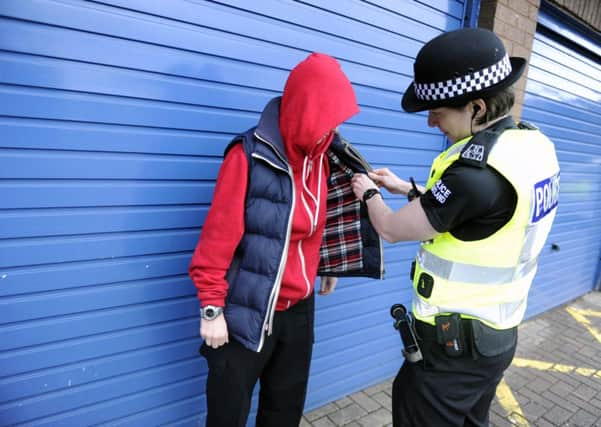Leaders: SNP’s law and order | Twitter trolls


Between January and November last year, Police Scotland searched 159 children aged under nine, while in the same period the Metropolitan Police in London searched 19.
This week that led Scottish Labour MSPs to ask SNP ministers if they were of the opinion that Scottish children were more criminal than children in the English capital. It was, one hopes, a rhetorical question.
Advertisement
Hide AdAdvertisement
Hide AdThe opposition in the Holyrood parliament quite rightly demanded action from the Scottish Government on what appeared to be the police’s inability to desist from the use of “stop and search” powers on children, despite earlier promises.
Yesterday, First Minister Nicola Sturgeon responded, saying she had spoken to Chief Constable Sir Stephen House and that the force was now considering halting its practice of “consensual” stop and search, not just for children but for everyone.
The distinction between “consensual” and “statutory” is important. A statutory stop and search is where police have reason to believe a person has committed a crime – in these circumstances police have a right to engage in a search of someone’s person.
A consensual stop and search is where the police office asks a member of the public if they would agree to a search.
The issue with children is whether a ten-year-old boy, for example, is really in a position to refuse a request from a police officer, and so whether any such search can truly be considered consensual. After the First Minister’s intervention, that distiction will become academic. The decision on children will no doubt be welcomed. But the fact that consensual searches on adults will also end may come as more of a surprise.
There are many lessons to draw from this saga. One is that the First Minister is once again having to intervene to clear up a mess left by former justice secretary Kenny MacAskill.
Mr MacAskill’s view of his relationship with Police Scotland seemed to be that whatever they wanted to do was fine by him.
He failed to intervene when Police Scotland authorised the use of armed officers on routine patrols. And he failed to intervene on stop and search.
Advertisement
Hide AdAdvertisement
Hide AdIt remains to be seen if Mr MacAskill’s determination to rid Scots law of the centuries-old need for corroboration – pushed through with the enthusiastic support of Sir Stephen in the face of almost unanimous opposition from the legal fraternity – can also be consigned to history.
Another lesson concerns the involvement – or, more accurately, lack of involvement – of the Scottish Police Authority, the body charged with representing the interests of the public in holding Police Scotland accountable. Not for the first time, the SPA has been posted missing.
Taking on the Twitter trolls
JUST a few short years ago, Twitter was widely regarded as a minority interest on the internet, a social media platform of dubious worth and even more dubious content.
Now it is one of the world’s most widely-used means of disseminating news – whether the latest thoughts of the Pope or pictures taken by proud bakers showing their latest creations inspired by the Great British Bake-Off.
What it is also renowned for is the often vile abuse sent by some users – many of them hiding behind a cloak of anonymity – in a practice that has become known as trolling.
Recently that abuse has taken an even more sinister turn, with some women – especially those campaigning for equality – being the target of rape threats.
The criminal justice system – and, arguably, society in general – has yet to fully assimilate the social and legal impact of Twitter and other social media. Debate still surrounds which offensive comments are simply free speech and which are unlawful, for example.
But as it wrestles with these quandaries it is important that society can call on those in charge of these immensely powerful companies to act responsibly, in concert with prevailing public opinion
Advertisement
Hide AdAdvertisement
Hide AdYesterday, Twitter chief executive Dick Costolo was revealed as one of those who thinks the company has not done enough to combat the trolls.
It is hard to disagree with his judgment that “we suck at dealing with abuse and trolls on the platform and we’ve sucked at it for years”. But it is certainly encouraging that remedying this has the support of the man at the top.